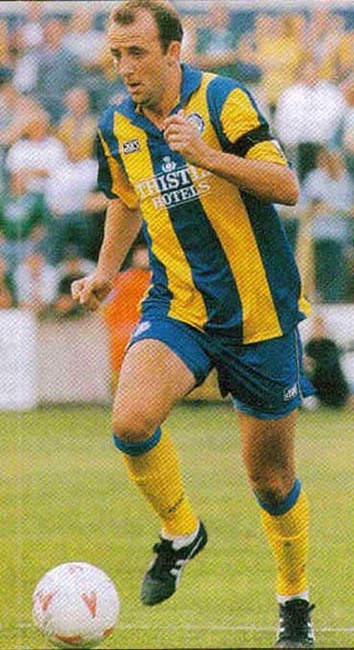

McAllister: Gary
1990-1996
(Leeds Player Details)(Player Details)
Midfield
Born: Motherwell, Lanarkshire: 25-12-1964
Debut: v Everton (a): 25-08-1990
6’1” 11st 11lb (1996)
#11 in 100 Greatest LUFC Players Ever

Born on Christmas Day 1964, he started with Fir Park Boys Club, before joining the
professional ranks with his native Motherwell in 1981. He was blooded into the Motherwell side
at a very early age with a substitute appearance in each of the 1981-82 and 1982-83 seasons
before making seventeen starts and four substitute appearances as Motherwell were relegated
from the Scottish Premier Division in 1983-84. He was then part of the Motherwell team of
1984-85 which gained promotion to the top flight as Champions of the Scottish First Division,
scoring six goals in thirty-four starts and one substitute appearance. There was constant
speculation in Scotland about his future because of his great vision and passing accuracy and
on 15th August 1985, after one game further for Motherwell in the 1985-86 season, he headed
for Leicester City with teammate Ally Mauchlen, later to have a month’s loan with Leeds, in a
£250,000 deal. He scored six goals in fifty-two starts and seven substitute appearances in the
Scottish League, together with two goals in seven starts in the Scottish Cup and three starts
and one game from the bench, without scoring, in the Scottish League Cup while at Fir Park. He
settled in well at Filbert Street and his classic passing style soon gained him plenty of
admirers and international recognition as he was called up by Scotland "B" firstly on 28th
April 1987 in a 1-1 draw with France "B" at Pittodrie, when he scored the Scottish goal, and
two days later at the same venue and against the same country he was again on target as the
scoreline was repeated in his Under-Twenty-One debut. He went on to gain a second
Under-Twenty-One cap on 14th November 1989 in a 2-0 win over Norway at Muirton Park, Perth,
home of St Johnstone, and on 27th March 1990 he returned to his former home ground of Fir Park
to gain his second "B" cap in a 0-0 draw with Yugoslavia, before making his full Scotland
debut on 25th April 1990 in a 0-1 defeat by East Germany at Hampden Park. His Leicester career
had seen him establish himself as a major force in their midfield and an outstanding talent in
the Second Division once Leicester had been relegated in 1986-87. He had regularly contributed
to the Foxes' goal tally with seven in thirty-one games in 1985-86, and nine in thirty-nine
games, while they were in the top flight and this continued as they fell into the Second
Division. He was the even club's leading goalscorer in two seasons, as he scored nine in
forty starts and two games from the bench in 1987-88 and ten goals in forty-three starts in
1989-90, but his best season was 1988-89 when he scored eleven goals in forty-six starts. He
had established his danger from set pieces, particularly from the penalty-spot and free-kicks
within shooting range. His international career had continued with two further caps in a 1-1
draw with Poland at Hampden on 19th May 1990 and then as a half-time substitute for Jim Bett
nine days later in a 2-1 win over Malta in Ta'qali. It was clear he was destined for greater
things, but he rejected a £1.15 million move to Nottingham Forest because he was unimpressed
by Brian Clough’s blunt approach. With Forest out of the picture and McAllister out of
contract, Leeds swooped and a transfer tribunal set the fee at £1 million. After scoring
forty-seven goals in one hundred and ninety-nine starts and two substitute League appearances,
together with two goals in five starts in the F.A. Cup, three goals in fourteen starts and
one game from the bench in the League Cup and four starts in the Full Members' Cup without
scoring, while at Filbert Street, he arrived at Elland Road with three caps to his name but
soon became a Scotland regular and became rated as one of Europe’s best midfielders. Midfield
Architect McAllister proved the most consistant Leeds player in his six seasons at Elland Road,
and was as articulate off the field as on it. After United had won the Second Division
Championship, Howard Wilkinson's investment of £1 million in the rising Leicester City star,
suggested a change of emphasis as Leeds sought to add skill to the muscular aspect of their
game. Leeds performed well in 1990-91, McAllister's first season at Elland Road. The club
finished fourth in the table and reached the League Cup semi-finals, not a bad accomplishment
for a newly promoted side. McAllister dovetailed perfectly with Gordon Strachan, David Batty
and Gary Speed and the all-star international midfield quartet were magnificent as Leeds won
the 1991-92 First Division title and followed up by taking the Charity Shield. The rest of
McAllister's time at Leeds saw the club fail to recapture those heights. The highest the club
finished during this period was fifth in 1993-1994 and 1994-1995 and the lowest was seventeenth
in 1992-1993, which was one of the worst finishes of a defending League champion in English
football history. Despite this, between 1992 and 1996, he captained the side and won a special
place in the hearts of Leeds United fans with his fine attitude and blistering long-range
strikes. His final season with Leeds, 1995-1996, may have been disappointing, as they finished
sixteenth in the Premiership, but it allowed McAllister to achieve one of his first footballing
ambitions, to captain a side at Wembley. He led his side out in the 1996 League Cup Final but
the game ended in a dismal 0-3 defeat by Aston Villa. McAllister succeeded Gordon Strachan as
captainfor both club and country and rarely missed a match in his time at Elland Road. He led
Scotland’s assault on the 1996 European Championships but unfortunately for him, he would
not want to dwell on the competition after missing a penalty which would have drawn Scotland
level against England at Wembley. It was all the more unusual, as apart from being the
possessor of a wide variety of skills, he was a proven deadly exponent of free-kicks and
penalties. He always looked comfortable in possession, packed a powerful shot and proved an
intelligent ambassador for the club before his sale to Coventry City for £3 million in July
1996. while at Leeds his International career had seen him score four goals in thirty-seven
starts and four games from the bench to bring his caps to forty-four. He scored his first
international goal in the fifty-third minute of a 2-1 win over Switzerland at Hampden Park
on 17th October 1990 and while he started and often captained the team, there were the
occasional games in which he came on as a substitute. There were three such occasions in
his early International career when he was a sixty-ninth minute substitute for Stuart McCall
at Ibrox Park in a 0-1 loss to the USSR on 6th February 1991, a fortieth minute replacement
for Mo Johnston at the Wankdorf Stadium in Berne in a 2-2 draw with Switzerland on 11th
September 1991 and once for Gordon Strachan in a 1-1 draw at Hampden Park against Finland on
25th March 1992. Varsity Stadium, Toronto was the venue as McAllister improved his goal
tally at International level with two goals, the first in the twenty-third minute and the
second from the penalty-spot with five minutes left on the clock, as Scotland overcame Canada
3-1 on 21st May 1992. His fourth goal came at Idrottsparken Norrkoping on 18th June 1992 in
the form of an eighty-fourth minute penalty, as Scotland beat the CIS 3-0 in an European
Championship Finals Group Two qualifier. His fifth and final substitute appearance came on
26th May 1996 at Willowbrook Memorial Park New Britain as a half-time replacement for Darren
Jackson as Scotland went down 1-2 to the USA. From 1996 until 2000 McAllister served Coventry
first under manager Ron Atkinson and then former Leeds team-mate Gordon Strachan. He scored
twenty goals in one hundred and nineteen starts in the League, as well as one goal in ten F.A.
Cup starts and five in eleven League Cup starts at Highfield Road. His International career
came to an end on 31st March 1999, when he Captained Scotland at Celtic Park as they went down
1-2 to the Czech Republic and he had added thirteen more caps to his collection to bring it to
fifty-seven, including five as a substitute. In his forty-eighth start for Scotland on 8th
June 1997, in a 1-0 win in Minsk over Belarus in a Group Four World Cup qualifier he scored
from the penalty spot to register his fifth and final International goal to get the Scotland
winner. He had just won the Coventry City "Player of the Year" award for the 1999-20000 season,
so it came as he shock when, on 1st July 2000, he completed a surprise move to Liverpool. Not
many would have doubted McAllister's ability but many Reds fans may have questioned manager
Gerard Houllier’s decision to sign a player who was by now thirty-five years old. With
Liverpool he won a League Cup winners’ medal, an FA Cup winners’ medal and a UEFA Cup winners’
medal in 2000-01, in which he also won the "Man of the Match" award in the final, and also won
the Charity Shield and European Super Cup in 2001-02. He scored five times in fifty-five League
appearances, twenty of which were as a substitute, he did not score in four starts and one game
from the bench in the F.A. Cup, but scored once in thrtee starts and three substitute
appearances in the League Cup and three goals in twenty-one European appearances of which
eleven were as a substitute, while at Anfield. On 13th May 2002 he became Player-Manager and
scored ten goals in fifty five League starts, as well as one goal in three starts in the F.A.
Cup and one goal in two starts in the League Cup in his second spell at Coventry. As the holder
of more than fifty caps he became a member of the Scotland Football Hall of Fame. He was a
member of the Scotland 1990 World Cup squad and captained their Euro 1996 team. In 2001 he
received an MBE for services to football. He became Managerat Elland Road on 29th January 2008
and led the club to the League One Play-off Final at Wembley. During his second season as
Manager McAllister was sacked on 21st December 2008 after a poor string of results. Since then
he has coveted the Motherwell Manager's job, turned down the offer of a job on the coaching
team for Scotland, and then finally decided not to become Paul Hart's assistant at Portsmouth.
On 20th May 2010 he was appointed First Team Coach at Middlesbrough by Gordon Strachan. On
18th September 2010, he became Gerard Houllier's Assistant Manager at Aston Villa. After
Houllier was rushed to hospital McAllister became Caretaker-Manager for the Premier League
home game against Stoke City on 23rd April 2011, which ended in a 1-1 draw. Although Villa
went down 1-2 at West Bromwich Albion a week later, McAllister was then in charge of the team
in a 1-1 home draw with Wigan Athletic the following weekend followed by a 2-1 away win
against Arsenal on 15th May 2011 and a 1-0 home win over Liverpool a week later. Despite this,
it was announced on 17th June 2011, that after the appointment of Alex McLeish as Manager,
that McAllister would not return to the club.